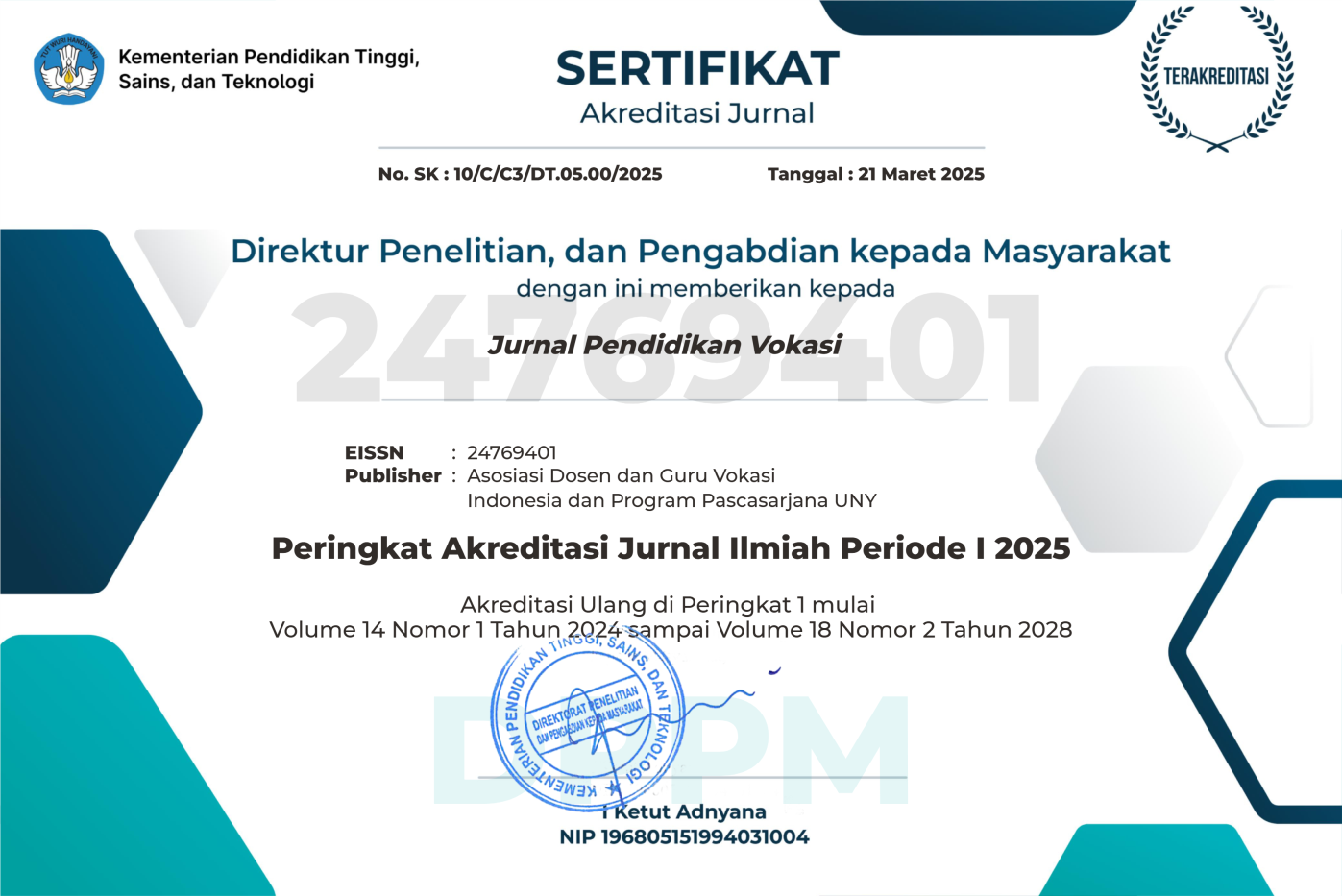Implementation of creative economy entrepreneurial character development through the culture of sustainable development and vocational stakeholders partnership
DOI:
https://doi.org/10.21831/jpv.v9i2.24354Keywords:
creative economy, entrepreneurial character, sustainable development, stakeholder partnershipAbstract
References
Fleming, T. (2007). A creative economy green paper for the Nordic Region. London: Nordic Innovation Centre. Retrieved from http://tfconsultancy.co.uk/reports/CreativeEconomy_NordicRegion.pdf
Fraenkel, J. R., Wallen, N. E., & Hyun, H. H. (2012). How to design and evaluate research in education (8th ed.). New York, NY: McGraw Hill.
Given, L. M. (2008). The SAGE encyclopedia of qualitative research methods. Thousand Oaks, CA: Sage Publications.
Kasali, R. (2017). Disruption. Jakarta: PT. Gramedia Pustaka Utama.
Kim, W. C., & Mauborgne, R. (2005). Blue Ocean Strategy: How to create uncontested market space and make the competition irrelevant. Boston, MA: Harvard Business School.
Meier, D. (2000). The accelerated learning handbook: A creative guide to designing and delivering faster, more effective training programs. New York, NY: McGraw Hill.
Muhadjir, N. (2011). Metodologi penelitian: Paradigma positivisme objektif, phenomenologi interpretif, logika bahasa Platonis, Chomskyist, Hegelian & Hemeneutik, paradigma studi Islam, matematik recursion, set-theory & structural equation modeling dan mixed. Yogyakarta: Rake Sarasin.
Raharjo, N. E. (2013). Model pengembangan kultur sekolah berbasis karakter kewirausahaan di Sekolah Menengah Kejuruan. Dissertation, Universitas Negeri Yogyakarta. Retrieved from https://eprints.uny.ac.id/22738/
Sinek, S. (2009). Start with why: How great leaders inspire everyone to take action. New York, NY: Portfolio Peguin Group.
Sudira, P. (2016). TVET abad XXI: Filosofi, teori, konsep, dan strategi pembelajaran vokasional. Yogyakarta: UNY Press.
The Central Bureau of Statistics. (2016a). Keadaan ketenagakerjaan Agustus 2016. Jakarta: The Central Bureau of Statistics of Indonesia.
The Central Bureau of Statistics. (2016b). Keadaan ketenagakerjaan Provinsi Bali Agustus 2016. Denpasar: The Central Bureau of Statistics of Bali.
Wiryomartono, B. P. (2014). Perspectives on traditional settlements and communities: Home, form and culture in Indonesia. Gateway East: Springer Singapore.
Downloads
Published
How to Cite
Issue
Section
Citation Check
License
The authors submitting a manuscript to this journal agree that, if accepted for publication, copyright publishing of the submission shall be assigned to Jurnal Pendidikan Vokasi. However, even though the journal asks for a copyright transfer, the authors retain (or are granted back) significant scholarly rights.
The copyright transfer agreement form can be downloaded here: [JPV Copyright Transfer Agreement Form]
The copyright form should be signed originally and sent to the Editorial Office through email to jpvokasi@uny.ac.id
Jurnal Pendidikan Vokasi by http://journal.uny.ac.id/index.php/jpv is licensed under a Creative Commons Attribution-ShareAlike 4.0 International License.












